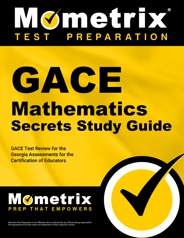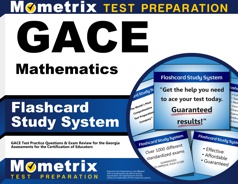The Georgia Assessments for the Certification of Educators (GACE) Mathematics examination is designed to assess the knowledge and skills of individuals seeking admission to an educator preparation program, certification in Georgia, or wanting to become qualified in teaching 6th-12th-grade mathematics.
Click “Start Test” above to take a free GACE Mathematics practice test, and check out our premium-quality GACE test prep resources by clicking the links below!
Exam Eligibility
If you are seeking admission or are enrolled in a Georgia state-approved teacher preparation program, you must have approval from your program provider to take the exam. Individuals who have completed a teacher education program or seek state certification will use their Georgia Professional Standards Commission (MyPSC) account.
GACE Mathematics Exam Outline
The GACE Mathematics assessment is made of two subtests, which you can take individually in two different sessions or all at once in one session. Test I and Test II have a time limit of 2 hours and 15 minutes each, and the combined test has a time limit of 4.5 hours.
Subtest I
The first subtest contains 50 selected-response questions and is split into three subareas, with each subarea containing two objectives:
Number and Quantity (30%)
- Understand and apply knowledge of the real number system and vector and matrix quantities.
- Understand and apply knowledge of quantities and the complex number system.
Algebra (40%)
- See structure in expressions and understand arithmetic with polynomials and rational expressions.
- Understand how to create equations and how to reason with equations and inequalities.
Discrete Mathematics and Calculus (30%)
- Understand and apply knowledge of discrete mathematics.
- Understand calculus concepts and apply knowledge to solve calculus problems.
Subtest II
The second subtest also contains 50 selected-response questions and is split into three subareas, with each subarea containing two objectives:
Functions (40%)
- Understand how to interpret functions and apply knowledge to build functions.
- Understand and apply knowledge of linear, quadratic, and exponential models and trigonometric functions.
Geometry (30%)
- Understand congruence/similarity/triangles/trigonometric ratios and equations for geometric properties.
- Understand circles, geometric measurement and dimension, and modeling with geometry.
Probability and Statistics (30%)
- Understand how to interpret categorical and quantitative data, make inferences, and justify conclusions.
- Understand conditional probability, the rules of probability, and using probability to make decisions.
Check Out Mometrix's GACE Mathematics Study Guide
Get practice questions, video tutorials, and detailed study lessons
Get Your Study Guide
Registration
To register for the GACE exam, you need to use your MyPSC account. If you do not have an account, create your account to receive your Georgia certification number. After you register for the Elementary Education exam on MyPSC, create an ETS GACE testing account. Your ETS account lists the test(s) you are approved to take. You will register for the exam through your ETS GACE testing account.
Fees
You can register to take the tests individually ($123) or combined ($193). Your test fee includes a $25 registration fee and a $28 test center fee. Individuals taking the GACE exam at an international testing site are subject to an additional $50 test site fee.
Test Day
On exam day, you should report to the testing center 30 minutes before your scheduled exam. If you arrive later than the listed reporting time on your admission ticket, you will not be able to take the exam and your testing fees will be forfeited.
You will be asked to provide at least one form of valid identification, which must contain your photo and signature.
Once the check-in process is complete, you will be asked to place all personal items (cell phone, keys, wallet, bags, etc.) in a secure locker outside the testing room.
Once you are ready, the proctor will lead you to the testing area and provide some short instructions before starting the exam.
How the Exam is Scored
When you have completed your exam, you are given the option to report or cancel your scores. They cannot be reinstated if you choose to cancel your scores.
You should also receive an unofficial score report right after the exam. Your official report will be made available about three weeks after the testing window closes.
Passing Score
The Georgia Professional Standards Commission (GaPSC), along with local education committees, established the minimum passing scores for the GACE content assessments:
- 220-249: Induction level
- 250: Professional level
If you take the combined test and one of your scores is at the induction level and the other is at the professional level, you will be considered as having only passed at the induction level.
Retaking the Exam
If you wish to retake the exam, you must wait at least 30 days.
Check Out Mometrix's GACE Mathematics Flashcards
Get complex subjects broken down into easily understandable concepts
Get Your Flashcards
FAQs
Q
How many questions are on the GACE Mathematics exam?
A
There are 100 selected-response questions on the exam.
Q
How long is the GACE Mathematics exam?
A
The time limit for the combined version of the exam is 4.5 hours.
Q
What is the passing score for the GACE Mathematics exam?
A
To pass at the induction level, a passing score is 220. To pass at the professional level, a passing score is 250.
Q
How much does the GACE Mathematics exam cost?
A
The fee for each test is $123, and the fee for taking the combined version is $193.

